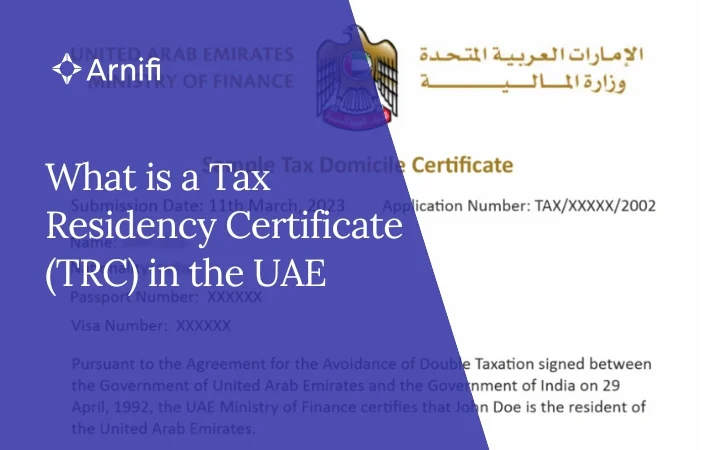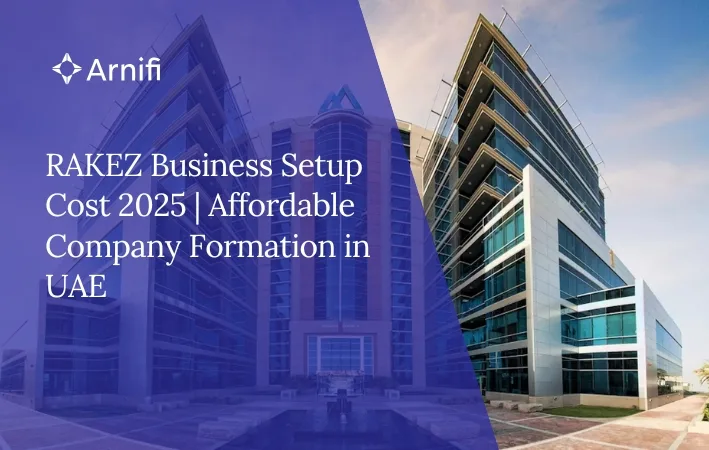Qualifying Income in UAE Corporate Tax
by
Shethana
Apr 26, 2024  12 MIN READ
12 MIN READ

FACTS
- The UAE Corporate Tax Law introduced a 9% corporate tax rate on income above USD 102,110 (AED 375,000) for companies.
- Qualifying Free Zone Persons (QFZPs) enjoy a 0% tax rate on their qualifying income, while non-qualifying income is taxed at the standard rate.
- Qualifying income differs for domestic companies, foreign permanent establishments, and businesses located in free zones.
Introduction
Have you ever asked yourself, “What is qualifying income in the UAE?”. By implementing the UAE Corporate Tax Law on 1 June 2023, companies now navigate a taxation framework that includes a 9% corporate tax rate on income above USD 102,110 (AED 375,000). However, for Qualifying Free Zone Persons, a favorable 0% tax rate applies to their qualifying income, which is defined as income that does not exceed 5% of the total revenue of the QFZP in that tax period or AED 5,000,000. In contrast, their non-qualifying income is taxed at the standard rate.
Corporate – Taxes on corporate income
February 16, 2024
Income tax is payable using a progressive rate system with rates up to 55% under the Emirate-level tax decrees. These tax decrees, however, have not been implemented in reality. Rather, separate bank regulations at the Emirate level impose income tax on foreign bank branches at a flat rate of twenty percent. Individual UAE concession agreements or fiscal letters impose income tax at different rates on businesses involved in petrochemical and oil and gas operations in the UAE.
The Federal UAE CT Law will apply to all business and commercial activities in all Emirates and take effect for each taxable person’s new financial year beginning on or after June 1, 2023, with the following exempt individuals (subject to conditions):
- government organization in the UAE.
- government-run organization in the United Arab Emirates.
- someone working in the United Arab Emirates in the extractive industry.
- An individual operating in the United Arab Emirates in the non-extractive natural resource industry.
- eligible public benefit organization.
- Investment fund that meets the requirements.
- Public pensions and social security funds, or private pensions and social security funds that satisfy any additional requirements set forth by the Minister and are governed by regulatory monitoring by the state’s appropriate body.
- legal entity established in the state and fully owned and managed by specific exempt individuals.
- Any additional individual that the Cabinet decides upon based on the Minister’s recommendation.
Introduction to Corporate Tax in the UAE
Corporate tax is a newly introduced concept in the United Arab Emirates (UAE). The UAE government implemented the UAE Corporate Tax Law on 1 June 2023, bringing a significant change to the tax landscape for businesses operating within the country. Under the new law, companies are subject to a corporate tax rate of 9% on their taxable income exceeding USD 102,110 (AED 375,000). This tax rate applies to companies operating in the mainland UAE. However, businesses operating within the Free Zones of the UAE enjoy a different tax regime, with a focus on qualifying income. Qualifying Free Zone Persons (QFZPs) benefit from a 0% tax rate on their qualifying income, while non-qualifying income is subject to the standard 9% tax rate. This new corporate income tax system in the UAE has brought about significant changes and implications for businesses, making it crucial for companies to understand and comply with the new regulations on the taxation of corporations.
Defining Qualifying Income in the Context of UAE Corporate Tax

Qualifying income plays a significant role in the UAE corporate tax system. It refers to the portion of a company’s revenue that qualifies for favorable tax treatment, specifically within the designated zones of the UAE. Qualifying income is subject to a 0% tax rate for Qualifying Free Zone Persons (QFZPs), while non-qualifying income is subject to the standard 9% tax rate. To determine whether income qualifies as qualifying income, businesses must meet specific criteria outlined in the UAE Corporate Tax Law. These criteria include the nature of transactions, the parties involved, and the types of activities conducted, all of which are subject to the regulatory oversight of the competent authority in the UAE. Understanding these criteria is crucial for businesses operating within the designated zones of the UAE to optimize their tax planning and compliance.
Examples of Qualifying vs. Non-Qualifying Income
Understanding the difference between qualifying and non-qualifying income is crucial for businesses operating within the Free Zones of the UAE. Here are some examples that illustrate the distinction between qualifying and non-qualifying income:
- Qualifying Income:
- Income from transactions with other Free Zone entities
- Income from transactions with Non-Free Zone Persons related to Qualifying Activities
- Income from manufacturing, processing goods or materials, holding shares and other securities, and regulated services
- Non-Qualifying Income:
- Income from Excluded Activities
- Income from transactions with natural persons (with some exceptions)
- Income from banking, insurance, finance, leasing sectors under regulatory watch
- Income from ownership or exploitation of immovable property or intellectual property assets
For Domestic Companies
Domestic companies operating in the mainland UAE are subject to the standard corporate tax rate of 9% on their taxable income. Qualifying income and non-qualifying income are both taxed at this rate. The tax liability of domestic companies is determined based on their business activities and taxable income. To optimize tax planning, it is important for domestic companies to accurately determine their taxable income and identify any qualifying income that may be subject to a favorable tax rate. By maximizing qualifying income and taking advantage of available tax incentives, domestic companies can reduce their overall tax liability and improve their financial performance.
For Foreign Permanent Establishments
Foreign companies operating in the UAE through a permanent establishment (PE) are subject to UAE corporate tax on their taxable income derived from the PE, including income from real estate transactions. A permanent establishment refers to a fixed place of business through which the foreign company conducts its business activities wholly or partially in the UAE. The tax liability of a foreign permanent establishment depends on whether its effective management and control are within the UAE. If the foreign company’s central management activities and decision-making occur within the UAE, it may be subject to UAE corporate tax. However, if the foreign company does not have a permanent establishment or derive state-sourced income in the UAE, it may not be subject to UAE corporate tax. Additionally, transfer pricing rules also apply to UAE businesses that have transactions with Related Parties and Connected Persons, irrespective of whether the Related Parties or Connected Persons are located in the UAE mainland, a Free Zone, or in a foreign jurisdiction. This means that all UAE businesses must carefully consider their transfer pricing practices to ensure compliance with UAE tax laws.
Qualifying Income for Businesses in Free Zones
Qualifying Free Zone Persons (QFZPs) can benefit from a 0% tax rate on their qualifying income, providing significant tax advantages. To qualify for this favorable tax treatment, Free Zone businesses must meet specific criteria outlined in the UAE Corporate Tax Law. The income must come from transactions with other Free Zone entities or Non-Free Zone Persons related to Qualifying Activities. By maximizing qualifying income and minimizing non-qualifying income, Free Zone businesses can optimize their tax efficiency and reduce their overall tax liability. Additionally, businesses must ensure that they are classified as a Qualifying Free Zone Person, or a UAE company incorporated in a Free Zone, in order to benefit from the 0% tax rate on their qualifying income.
Filing Deadlines and Procedures

Businesses operating within the UAE, including Free Zone businesses, must adhere to specific filing deadlines and procedures for corporate tax compliance. The tax period for corporate tax is generally one calendar year, unless otherwise specified. Businesses must ensure that they file their corporate tax returns within the prescribed filing deadlines to avoid penalties and non-compliance. The filing procedures may involve submitting the tax return electronically through the designated portal and providing all relevant information and supporting documentation. It is important for businesses to stay updated on the latest filing deadlines and procedures set forth by the competent authority to ensure timely and accurate filing of corporate tax returns.
Tax Incentives and Exemptions
The UAE offers various tax incentives and exemptions to businesses, including those operating within Free Zones. Qualifying Free Zone Persons (QFZPs) can benefit from a 0% tax rate on their qualifying income, providing a significant tax advantage in the form of tax relief. In addition, businesses may also be eligible for other tax incentives and exemptions based on their qualifying income and activities.
Income Exempt
In an effort to prevent double taxation and to acknowledge the United Arab Emirates as a major hub for international business and a prime location for holding companies, the UAE CT regime excludes certain types of income as well as dividends and other profit distributions received by taxable individuals from entities that are tax residents of the UAE (local dividends, for example) or from non-residents of the UAE. However, entities that are incorporated in the UAE will automatically be considered ‘Resident Persons’ for the purposes of UAE Corporate Tax, and therefore may not be exempt from certain income.
Exemption from participation :
1. At least 5% of the ownership is held in
2. There is a 12-month holding period that is continuous (or a 12-month holding intention).
3. the participation is taxable at a rate not less than 9% in its home country or territory;
4. at least 50% of the assets owned by the participation, whether directly or indirectly, are ownership interests or entitlements that would not be eligible for the participation exemption if they were held by the taxable person directly.
The condition for “subject to tax” would be met if :
1. If the involvement generates income or profits, an effective tax rate (ETR) of 9% is applied.
2. If the tax regime of the appropriate jurisdiction does not allow for a 9% ETR, then a 9% ETR can be determined by recalculating using the UAE CT Law’s provisions.
3. If the ownership interest’s acquisition cost exceeds AED 4 million, a participating stake of less than 5% may also be eligible for the exemption.
Common Pitfalls to Avoid
When dealing with qualifying income within the UAE’s corporate tax regime, businesses should be aware of common pitfalls to avoid. Here are some common pitfalls that businesses should be cautious of:
- Misclassifying income: Businesses must accurately classify their income as either qualifying or non-qualifying to ensure proper tax treatment.
- Inadequate record-keeping: Proper documentation is essential to support claims of qualifying income. Inadequate record-keeping can lead to non-compliance and potential penalties.
- Failure to meet de minimis requirements: Businesses must monitor their non-qualifying revenue to ensure it does not exceed the specified thresholds set by the UAE Corporate Tax Law.
- Lack of awareness of regulations: Businesses should stay updated on the latest tax regulations and seek professional advice to ensure compliance with the tax regime.
What to Expect During an Audit
During an audit conducted by the competent authority, businesses can expect a thorough examination of their financial records, transactions, and compliance with the UAE Corporate Tax Law. The objective of the audit is to verify the accuracy of the tax returns filed by businesses and ensure compliance with the tax regulations. The competent authority may request additional documentation, conduct interviews, and perform on-site inspections as part of the audit process. It is important for businesses to cooperate fully and provide accurate and complete information to the competent authority during the audit. By being prepared and proactive, businesses can ensure a smooth audit process and demonstrate their compliance with the UAE Corporate Tax Law.
Conclusion
Understanding qualifying income in the UAE corporate tax system is crucial for businesses. It determines tax liabilities, compliance, and eligibility for incentives. Qualifying income must meet specific criteria to ensure accurate reporting and avoid pitfalls during audits. By documenting and understanding the scope of qualifying income, businesses can optimize tax benefits and navigate compliance requirements effectively. Preparing financial records meticulously and staying informed about free zone regulations are essential steps. Ultimately, a clear grasp of qualifying income empowers businesses to make strategic decisions, minimize tax challenges, and maximize opportunities for growth within the UAE corporate tax framework.
About Arnifi
Arnifi is digital first Corporate service provider helping companies enter the Middle East region, starting with UAE and Saudi Arabia markets. Founded and backed by professionals from Amazon, Souq and other large companies operating in KSA – the team understands what it takes to succeed as a startup in both UAE and Saudi Arabian markets, apart from going through the setup process multiple times. Arnifi will provide a truly digital experience to entry and scale up of companies both UAE and Saudi Arabia. Discover tailored solutions and strategic partnerships that propel your business forward. Check out at – www.Arnifi.com for more details.
Frequently Asked Questions (FAQ)
What Constitutes Qualifying Income for a New Business in the UAE?
Qualifying income for a new business in the UAE refers to the portion of the business’s revenue that qualifies for favorable tax treatment under the UAE Corporate Tax Law. To determine qualifying income, the business must meet specific criteria outlined in the law, including the nature of transactions and activities conducted.
How Does Qualifying Income Affect Tax Liability?
Qualifying income affects tax liability by providing businesses with favorable tax treatment. Qualifying Free Zone Persons (QFZPs) benefit from a 0% tax rate on their qualifying income, reducing their overall tax liability. Non-qualifying income is subject to the standard corporate tax rate of 9%.
Can Qualifying Income Status Change Over Time?
Yes, the qualifying income status of a business can change over time. It is important for businesses to monitor their qualifying income and ensure that they continue to meet the criteria outlined in the UAE Corporate Tax Law. If the business no longer meets the criteria, their qualifying income status may change, affecting their tax liability.
READ MORE : Easy Entry! Online Education Platforms in UAE Made Simple
READ MORE : How to Launch an Online Education Business in Dubai
Top UAE Packages

Related Articles
Top UAE Packages



